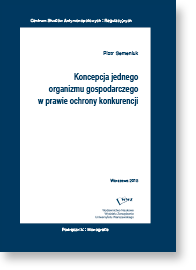The book discusses the conditions of application of the single economic doctrine in competition law. The basis legal regime subject to the analysis in the thesis is the Polish and the EU competition law (antimonopoly law, antitrust law). Because the Polish and the EU antimonopoly regulations refer to the single economic unit doctrine in a very general way, the author also discusses additional legal regimes, mainly the US law.
In the book the author examines various justifications for the existence of the single economic unit doctrine in competition law, confronts this doctrine with economic sciences (in particular with the “theory of the firm”) and reviews the basis positions regarding this doctrine expressed by scholars, courts and competition law enforcers.
The main objective of the thesis, apart from systematizing the exiting views expressed by scholars and courts, is to prove that the doctrine of single economic unit can take different meanings and should be subject to nonhomogeneous analysis depending on legal norms for the application of which it is used. The above should be the case even despite the fact that the single economic unit doctrine is based on a homogenous ontological phenomenon (the phenomenon of a “firm” described by economic sciences). Each legal norm of the antitrust system is motivated by different aims and functions. Depending on those functions and aims the single economic unit doctrine should be applied in a different manner. Referring to one, objectively understood, doctrine of single economic unit can be a substantial simplification.


